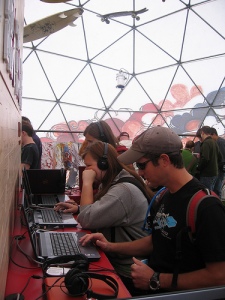We’ve mentioned previously that there is an emerging trend of partnerships in the music industry, with bands and brands joining forces to explore new ways of reaching consumers and cultivating common passions. We witnessed more of this trend while attending the Virgin Mobile Festival in Baltimore. One attraction at the Virgin Festival that seemed to draw a ton of people in was the Dell Dome.
The dome is part of the Dell Summer Rocks tour. They are road tripping to all the summer’s hottest music festivals and the tent adds to the sensory experience of the weekend by offering a combination of technology, art and music for visitors to show off their individual style. Festival goers can meet urban artist Mike Ming, or personalize their own digital mix tape, rock ‘n’ roll hairstyle and airbrush tattoo. Also, media are invited to ask questions of any of the performers lined up for interviews inside the Dome. A pretty cool way of promoting the new (very colorful) studio laptops (check out their creative Towel Drop promo).
Dell is working with festival promoters to include the brand where it can be experienced by this passionate community of people who align themselves with a lifestyle of self expression. They are giving them an interactive experience. Here we see yet another trend that is hard to ignore: music fans are craving interaction with the music and musicians they like more and more. The days of sitting around listening to music passively are fading.
In addition to the hands-on experience Dell offers in their dome, they have been chatting with artists at the festivals and posting video interviews. As our readers know, we here at Evolving Music love interviews. The Dell Lounge interviews are a great way to get to know some up-and-coming artists and see them kickin back in a casual festival setting. As of today, the Dell Summer Rocks tour is halfway through their road trip.
Starting at Lollapalooza, they snagged interviews (check any of them out here) with the likes of Bang Camaro, Cadence Weapon, beautiful Swedish crooner Sofia Talvik, and The Whigs.
Click around in the Virgin interview section to hear from Soulwax (one of our favorites from the DJ tent), Taking Back Sunday, and Deadmau5 among others. I had never heard of Deadmau5 before Virgin, but am definitely a fan now.
Outside Lands, which was in our own backyard, of course had all the big headliners like Jack Johnson, Tom Petty, and Radiohead (who kicked ass but dealt with some unexpected technical difficulties) to please the masses. But let’s not forget about some of the lesser known acts that rock as well. Dell caught some of these kids on tape here. Don’t miss the Howlin Rain interview. It takes place during a ping pong game.
Lastly, check out the class=”xLink”Bumbershoot Festival interviews from Seattle here for a personal look at Tapes ‘n Tapes (they opened for the Black Keys, who we like, earlier this year), Shim, and many more. I like the dude from Shim with the crazy mutton chops. He’s goofy.
So there you have it. A personal look at some of the artists from this summer’s festival season and the interactive experience offered to festival goes in the Dell Summer Rocks tent. When it comes to the intersection of technology, art, and music, you know where it’s at: interaction, personalization, and self-expression.






